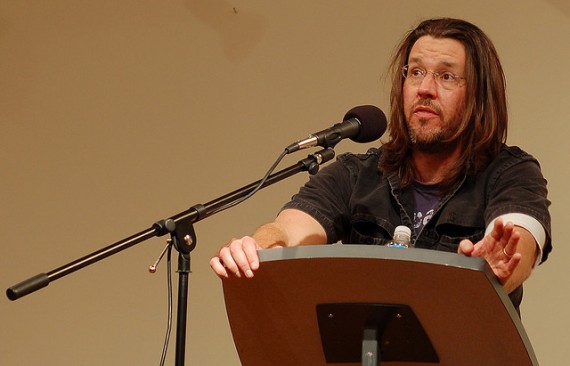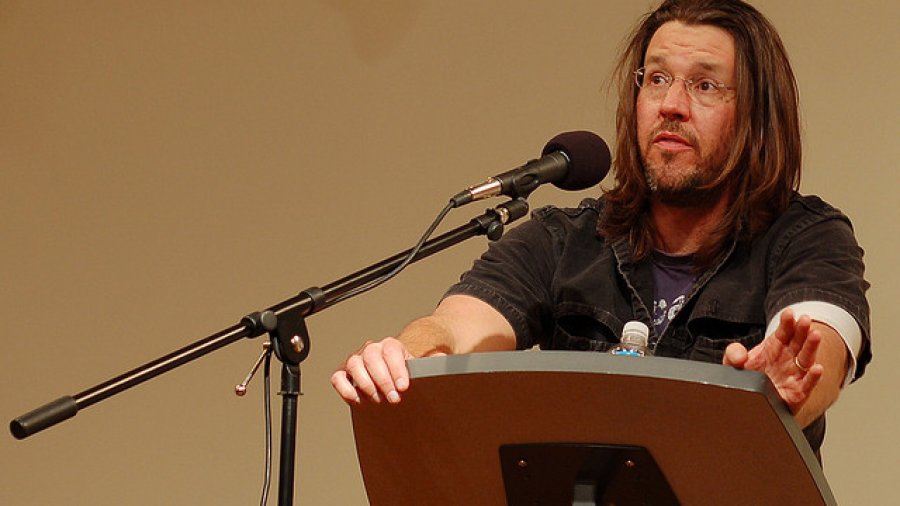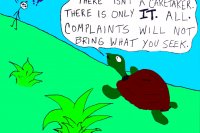David Foster Wallace is one of my personal heroes.
Maybe you’ve never heard of him. Wallace (or DFW) was a novelist, essayist, short story writer, and arguably one of the most notable geniuses of the past few decades.
Time magazine cited his novel, “Infinite Jest”, as one of the top 100 novels from 1923 – 2005. Sadly, Wallace committed suicide in 2008, due to the terrible depression that had plagued him throughout his life.
With brilliance oozing from his every pore and critics swooning over his work, one might imagine that Wallace was an egotistic, pretentious intellectual. From what I can gather, though, he was nothing of the sort.
Before I go any further, I urge you — no, I implore you — to please watch this video. It’s a short film entitled “This is Water”. The narration is an excerpt from a commencement speech that Wallace delivered to graduates of Kenyon College in 2005.
(Note: This is the full speech. The beautiful ‘This is Water’ film was removed from YouTube because of a Copyright infringement. This is still an extraordinary speech, though. You can also read the entire speech here.)
Wallace had an incomparable knack for finding the perfect stories and anecdotes to illustrate his point. He used the story of the three fish to make his argument more impactful, but what was the main premise exactly?
What was the “water” that he was suggesting is often one of the most difficult things for us to see?
In a word, connectedness.
Wallace pointed out that our “default setting” is that of the ego. Our ego (our sense that we’re an I) operates from a very limited perspective — a perspective which deems itself far more important than anything else.
Wallace posited that the effect of a true education is a sort of humbling, a realization and growing awareness of oneself as a single piece of the puzzle and of multiple ways to view a single situation.
And, we need this education, this awareness, to see and understand the “water” that is always staring us in the face — the fact that there are 7 billion other people on this planet, each with their own problems, fears, desires, and dreams.
Empathy is Gold
In that commencement speech, Wallace was urging the graduating class to recognize that there is a choice. Every day, we can allow others to annoy and upset us. We can look down on them and bemoan the fact that we’re in their proximity. Or, we can do something else.
We can empathize.
We can make an effort to grasp that we are not so different from those around us. In fact, we’re of the same flesh and blood, and furthermore, the same atomic star stuff that erupted from supernova blasts billions of years ago.
And when we understand that we’re the same, we can see that we’ve all been thrust into this existence together. From there, all we need is a little imagination. With a bit of imagining, we can consider what possible circumstances or influences are causing others to act or be the way that they are.
We can remember that we ourselves are not always the most likable people either, that we have flaws too. We can see that everyone is doing the best they can with the level of awareness they’ve attained.
And then, we can do the work of cutting others some slack, of compassion. We can take a step back and see our own struggle reflected in theirs.
Acceptance is Freedom
Wallace was talking about empathy, but he was also talking about acceptance. He chose to frame it in terms of how to be “well-adjusted”, and he pointed out that empathizing with those around us is an important means of retaining stability and sanity.
While other people might be one of the main things that annoy us about the world, there are countless other things too. But when we get down to it, all of our irritation and anger stem from one thing: a refusal to accept things as they are.
I’ve said this before — all we can do is direct our energy and effort in the present moment and let go of the rest. If we can do that — if we can accept our circumstances and the people around us — we can liberate ourselves from the senseless drama that so often governs our lives.
To use Wallace’s word, this is what it means to be “well-adjusted”. Not just to society, but to life itself.

The Late DFW (Photo Credit: Steve Rhodes)
So, Here’s the Thing…
If you read more of David Foster Wallace’s work, you’ll find that he was an unbelievably erudite man — he seemed to know about everything. And yet, the underlying sentiment of many of his essays and fiction is this:
Please, humanity, be more compassionate.
“This is Water” is just one example. Today, I read Wallace’s powerful essay, “Consider the Lobster“, as well as this incredible short story from his collection, “Brief Interviews With Hideous Men”. Both pieces are ingenious works that attempt to nudge humanity toward more compassion.
You see, Wallace believed in the human spirit. He believed that love and compassion were more than outdated clichés. He believed they were something we could wake up to and embrace.
Despite paralyzing depression, Wallace produced an insanely large body of work. He did so in the service of revealing to humanity its flaws and suggesting a higher path.
Those of us who encounter his work have a choice: we can shrug off his ideas on one hand; or, we can choose to honor his legacy by reaching for the ideals that he found most essential.
We can continue to damage one another and ourselves through intolerance and separation. Or, we can aim to be kind, see others with empathy, and move in the direction of a more unified and understanding world.
You decide.
About Jordan Bates
Jordan Bates is a Lover of God, healer, mentor of leaders, writer, and music maker. The best way to keep up with his work is to join nearly 7,000 people who read his Substack newsletter.




